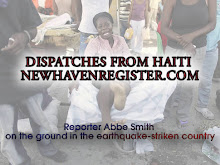Teaching women's health
There is a word in Creole that does not exist in the English language: pedisyon.
It translates to something like this: being pregnant for a long time – years even – while still having a monthly menstrual cycle. It is an example of the void of education about women’s health issues among peasant populations in Haiti
 Multiple times during the trip, women of child-bearing age and some far too old to have children complained to doctors that they have been pregnant for years but the baby will not come out of the belly. The women usually describe getting pregnant and then having a hemorrhage, followed by a return of their monthly period. They think the baby is still in their belly. Some of the women say they can feel kicking. The women do not understand that they have miscarried and there is no baby.
Multiple times during the trip, women of child-bearing age and some far too old to have children complained to doctors that they have been pregnant for years but the baby will not come out of the belly. The women usually describe getting pregnant and then having a hemorrhage, followed by a return of their monthly period. They think the baby is still in their belly. Some of the women say they can feel kicking. The women do not understand that they have miscarried and there is no baby. “Tell her there is no chance she is pregnant. You cannot be pregnant for two years,” she tells the interpreter.
The woman looks confused, and disbelieving. She is rail thin and does not have the extended belly of a pregnant woman. But she uses the word “pedisyon,” a word she probably learned from her mother.
“I think they need education on pregnancy and menstrual cycles,” Thiviyarajah later explains. The misinformation gets passed down through generations of women.
The team also treats multiple women for sexually transmitted disease. They prescribe antibiotics for the women and try to explain to them that they need to have their sexual partners get treated for the disease as well. There is also wide-spread anemia among women of child-bearing age because they are malnourished and have multiple children at a young age. One 40-year-old woman tells doctors she has had 16 children, although six of them died.
There is a lot of ground to cover with the education of women about health issues, but the team has made a start, one woman at a time. Dispelling the idea of pedisyon is just the beginning.
Labels: Abbe Smith, Creole, Haiti, Marbial
 RSS
RSS

